
Yuri Vladimirovich Andropov was a Soviet politician who was the sixth leader of the Soviet Union and the fourth General Secretary of the Communist Party of the Soviet Union, taking office in late 1982 and serving until his death in 1984.
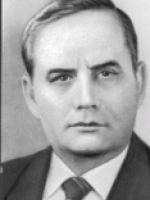
Vladimir Antonovich Ivashko was a Soviet Ukrainian politician, briefly acting as General Secretary of the Communist Party of the Soviet Union (CPSU) during the period from 24 to 29 August 1991. On 24 August Mikhail Gorbachev resigned from the post, and on 29 August the CPSU was suspended by the Supreme Soviet. Before becoming General Secretary he had been voted Gorbachev's Deputy General Secretary within the Party on 12 July 1990, a newly created position as a result of the 28th Congress of the Communist Party.

The Federal Security Service of the Russian Federation is the principal security agency of Russia and the main successor agency to the Soviet Union's KGB; its immediate predecessor was the Federal Counterintelligence Service (FSK) which was reorganized into the FSB in 1995. The three major structural successor components of the former KGB that remain administratively independent of the FSB are the Foreign Intelligence Service (SVR), the Federal Protective Service (FSO), and the Main Directorate of Special Programs of the President of the Russian Federation (GUSP).

The Foreign Intelligence Service of the Russian Federation or FIS RF is Russia's external intelligence agency, focusing mainly on civilian affairs. The SVR RF succeeded the First Chief Directorate (PGU) of the KGB in December 1991. The SVR has its headquarters in the Yasenevo District of Moscow with its director reporting directly to the President of the Russian Federation.

The First Main Directorateof the Committee for State Security under the USSR council of ministers was the organization responsible for foreign operations and intelligence activities by providing for the training and management of covert agents, intelligence collection administration, and the acquisition of foreign and domestic political, scientific and technical intelligence for the Soviet Union.
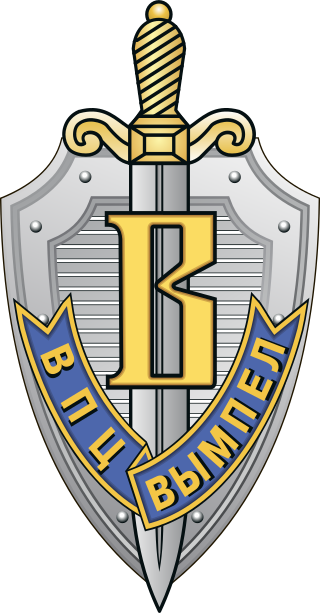
Directorate "V" of the FSB Special Purpose Center, often referred to as Spetsgruppa "V"Vympel, but also known as KGB Directorate "V", Vega Group, is one of the two tier one spetsnaz units of the FSB under the command of the FSB.
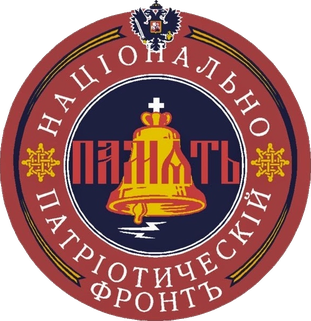
The National Patriotic Front "Memory" was a Russian far-right antisemitic, and monarchist organization.
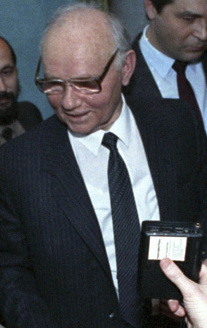
Vladimir Aleksandrovich Kryuchkov was a Soviet lawyer, diplomat, and head of the KGB, member of the Politburo of the Central Committee of the CPSU.
The Ministry of State Security, abbreviated as MGB, was a ministry of the Soviet Union from 1946 to 1953 which functioned as the country's secret police. The ministry inherited the intelligence and state security responsibilities of the People's Commissariat for Internal Affairs (NKVD) and People's Commissariat for State Security (NKGB). The MGB was led by Viktor Abakumov from 1946 to 1951, then by Semyon Ignatiev until Stalin's death in 1953, upon which it was merged into an enlarged Ministry of Internal Affairs (MVD).

FAPSI or Federal Agency of Government Communications and Information (FAGCI) was a Russian government agency, which was responsible for signal intelligence and security of governmental communications.

The Ministries of the Soviet Union were the government ministries of the Soviet Union.
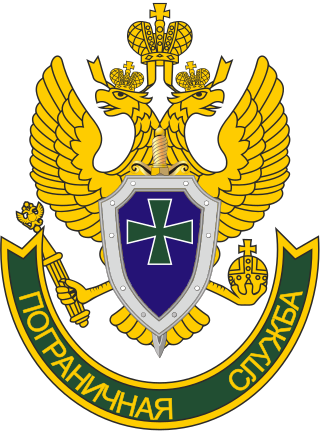
The Border Service of the Federal Security Service of the Russian Federation is a branch of the Federal Security Service of Russia tasked with patrol of the Russian border.

Filipp Denisovich Bobkov was a Soviet and Russian KGB functionary, who worked as the chief of the KGB subunit responsible for repressing dissent, which was responsible for suppression of internal dissent in the former Soviet Union. He was widely regarded the chief KGB ideologist or "KGB brain".
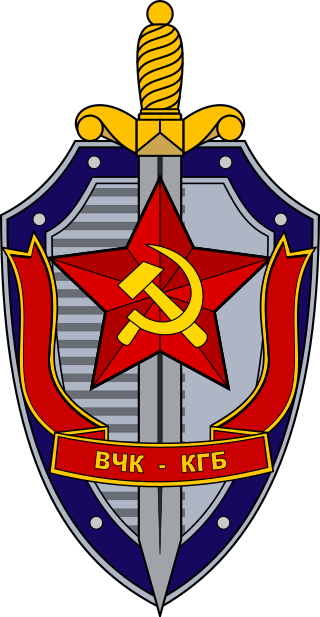
The Committee for State Security, abbreviated as KGB was the main security agency of the Soviet Union from 1954 to 1991. It was the direct successor of preceding Soviet secret police agencies including the Cheka, OGPU, and NKVD. Attached to the Council of Ministers, it was the chief government agency of "union-republican jurisdiction", carrying out internal security, foreign intelligence, counter-intelligence and secret police functions. Similar agencies operated in each of the republics of the Soviet Union aside from the Russian SFSR, where the KGB was headquartered, with many associated ministries, state committees and state commissions.
The KGB Security Troops were the uniformed paramilitary troops of the Soviet KGB which engaged in military-related activities that are not mentioned in legislation governing the Soviet Armed forces. The KGB controlled elite units that guarded the highest party officials and stood a continuous ceremonial guard at the Lenin Mausoleum. The special KGB signal troops also operated communications linking the party with the Ministry of Defense and the major territorial commands. Another KGB armed force guarded sensitive military, scientific, and industrial installations in the Soviet Union and, until the late 1960s, controlled Soviet nuclear warhead stockpiles. They also guarded government installations, operated the Moscow VIP subway, and secured Government–Party telephone system.
Russian espionage in the United States has occurred since at least the Cold War, and likely well before. According to the United States government, by 2007 it had reached Cold War levels.
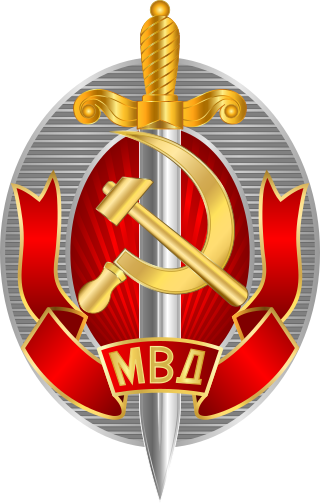
The Ministry of Internal Affairs of the USSR was the interior ministry of the Soviet Union from 1946 to 1991.

Mikhail Ivanovich Barsukov is a former Russian intelligence and government official. His most notable post was as the short-lived head of the Federal Security Service of the Russian Federation (FSB) in mid-1990s.

Vadim Viktorovich Bakatin was a Russian politician who served as the last chairman of the KGB in 1991. He was the last surviving former chairman of this organization. He was appointed to dismantle the KGB, but he was unable to control this organization and to fulfill the task due to political reasons. However, he was able to fulfill a plan to disintegrate the intelligence agency into separate organizations. He ran for the Russian presidency as an independent candidate in June 1991.

The Special Communications and Information Service of the Federal Protective Service of the Russian Federation is a cryptologic intelligence agency of The Federal Protective Service of Russia responsible for the collection and analysis of foreign communications and foreign signals intelligence, as well as protecting Russian government communications and information systems, which involves information security and cryptanalysis/cryptography.
















